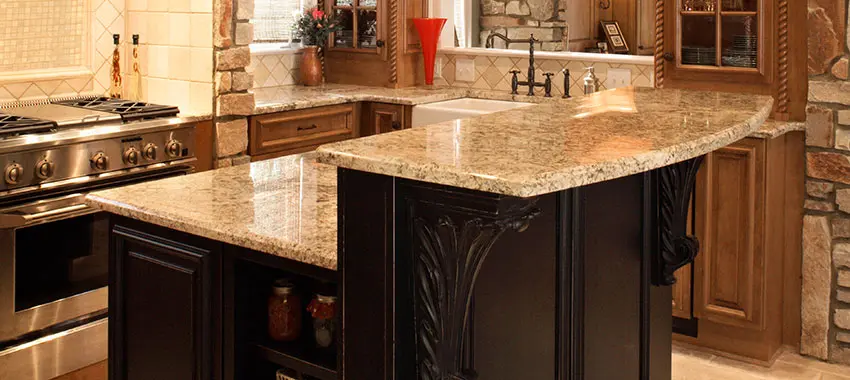Aug
What Should You Know About Sealing Granite Countertops?
You should seal your countertops to prevent them from staining. What should you know about sealing granite countertops? Well, there are plenty of things you should know with the common ones being:
You should seal the countertops at installation.
Most of the granite slabs come the same way they were at the granite store—bare, unsealed, and prone to staining. As you can guess, installing the countertops and leaving them this way is catastrophic as they will be at great risk should a drink spill on them.
For you to be at peace that no stain will result should a spill happen, ensure that the contractors properly seal the countertops before they leave.
Reseal the countertops every year
Even after the contractors install the countertops and seal them, you should make it a habit to reseal them at least once a year. The reason for this is because the sealant tends to wear off with time, and you have to reinstall it to restore its effectiveness.
While it’s good to reseal the countertops, you shouldn’t do it blindly. Before you apply the sealant, test the countertops to confirm they are ready for the sealant.
How do you do this?
There are plenty of ways to go about it. One of the ways is to do the oil and lemon test. Here you need to spill a few drops of lemon juice and cooking oil on the countertops and let them sit on the surface for at least five minutes, then wipe them dry.
If there are dull spots on the areas where the lemon juice hit the surface, the seal might have worn off, and it’s time to reinstall it. The same thing applies if the surface turns dark almost immediately after placing oil or lemon juice.
If the oil and juice stay on the surface for over five minutes without sinking, the chances are high that the granite doesn’t need sealing, and you should leave it in its present form.
Another test you can do to determine if the countertops are ready for sealing is the water drop test. Here you need to drip a small puddle of water on the stone, and if the store immediately darkens, it’s time to reseal it.
If the stone takes 4-5 minutes to darken, the sealer might have worn out, and it’s time to install a new one.
You can seal the countertops by yourself?
Although sealing is such an important part of maintaining the countertops, did you know you don’t have to hire a professional to do it?
To save money and learn a skill, do the sealing yourself. Begin with cleaning the countertops. As a rule of thumb, clean the countertops at least 24 hours before you apply the sealant.
The purpose of sealing the countertops is to get rid of any damaging vinegar, baking soda, lemon juice, harsh cleansers, and bleach.
Remove all the materials on the countertops and wipe them down with a clean, dry microfiber cloth. Then, you should mix one teaspoon of dishwashing detergent and two tablespoons of isopropyl alcohol in a pint spray bottle and fill it with cool water.
Generously spray the countertop, wipe it clean while polishing in a circular motion, and then wait 24 hours before proceeding.
As mentioned above, you should do the cleaning at least 24 hours before you apply the sealant. This is to give the cleaning liquid enough time to evaporate fully.
The next morning, apply a sealant over the entire granite counter begging from the end and work your way to the other. For an easier time and ideal results, apply the sealant in sections, in a circular motion.
Once you are done, give the sealant enough time to absorb, then using a clean, soft, dry rag, wipe out the extra sealant.
If the sealant requires another coat, give it time to cure (between 2-40 hours). To avoid wiping off the sealant, granite installers Rockville recommend you wait for at least 48 hours before wiping the surfaces with a wet substance.
You also should leave the countertops for the same amount of time before returning the kitchenware.


